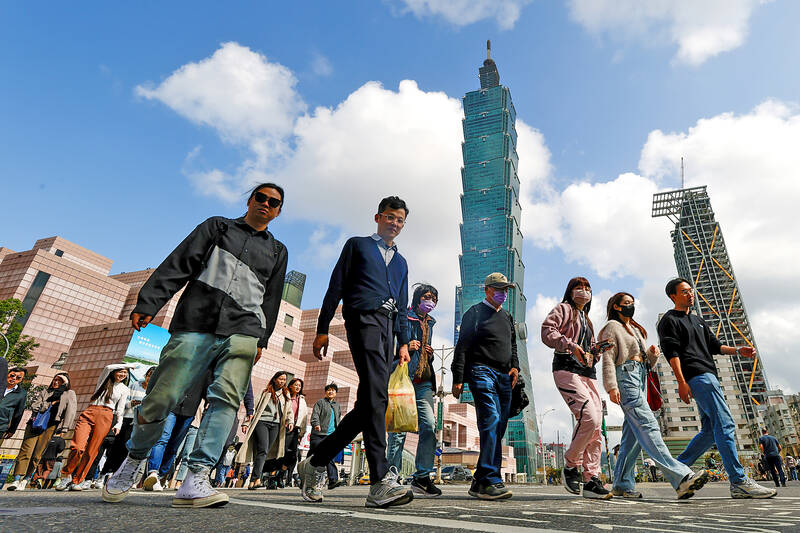The Directorate-General of Budget, Accounting and Statistics (DGBAS) yesterday trimmed its forecast for Taiwan’s GDP growth this year to 3.14 percent from the 3.29 percent it projected in November last year, as budget cuts are expected to curtail government expenditure and potential US tariff hikes raise uncertainty over global trade.
“Taiwan’s exports and private investment would remain robust on the back of expanding global investments in artificial intelligence [AI],” DGBAS Minister Chen Shu-tzu (陳淑姿) said.
The downward revision was also due to a high comparison base last year, when GDP growth was 4.59 percent, higher than 4.27 percent the agency had projected, Chen said.

Photo: Ritchie B. Tongo, EPA-EFE
GDP growth last quarter also fared stronger at 2.9 percent, beating the forecast by 1.06 percentage points, she said.
The high base exacerbates trade protectionism that is clouding the economic landscape internationally, while budget cuts by the legislature would affect government consumption and fixed investment, Chen said.
US President Donald Trump has threatened to impose tariffs of up to 100 percent on semiconductors, unfavorable for Taiwan’s chipmakers, which supply the bulk of the world’s chips.
Global trade is expected to grow 3.2 percent this year, slightly weaker than a 3.4 percent pickup last year, the DGBAS said, citing a report by the IMF.
Exports, a main growth driver for Taiwan, might expand 7.08 percent to US$508.6 billion, slowing from a 9.85 percent gain last year, it said.
However, rising demand for AI applications and high-performance computing would continue to bolster local firms in their supply chains, it said.
Lawmakers removed NT$39 billion (US$1.19 billion) from the central government’s budget for this year and froze an additional NT$63.6 billion, Chen said.
If the freezes remain, GDP growth might have difficulty staying above 3 percent, as the DGBAS would have to drop 0.2 to 0.3 percentage points from its prediction, Chen said.
Nevertheless, a stable labor market with wage increases would allow consumer spending to rise 2.12 percent, the DGBAS said.
At the same time, local semiconductor manufacturers are upgrading their processing technologies and packaging capacities to stay competitive and meet demand, it said.
The trend bodes well for private investment, which might grow 6.18 percent, an improvement of 0.61 percentage points from the previous forecast, the DGBAS said.
The aviation industry would also contribute to private investment, as demand for cross-border travel is rising, it said.
Consumer prices would return to within the central bank’s target range with an annual growth rate of 1.94 percent, the DGBAS added.

Seventy percent of middle and elementary schools now conduct English classes entirely in English, the Ministry of Education said, as it encourages schools nationwide to adopt this practice Minister of Education (MOE) Cheng Ying-yao (鄭英耀) is scheduled to present a report on the government’s bilingual education policy to the Legislative Yuan’s Education and Culture Committee today. The report would outline strategies aimed at expanding access to education, reducing regional disparities and improving talent cultivation. Implementation of bilingual education policies has varied across local governments, occasionally drawing public criticism. For example, some schools have required teachers of non-English subjects to pass English proficiency

‘FORM OF PROTEST’: The German Institute Taipei said it was ‘shocked’ to see Nazi symbolism used in connection with political aims as it condemned the incident Sung Chien-liang (宋建樑), who led efforts to recall Democratic Progressive Party (DPP) Legislator Lee Kun-cheng (李坤城), was released on bail of NT$80,000 yesterday amid an outcry over a Nazi armband he wore to questioning the night before. Sung arrived at the New Taipei City District Prosecutors’ Office for questioning in a recall petition forgery case on Tuesday night wearing a red armband bearing a swastika, carrying a copy of Adolf Hitler’s Mein Kampf and giving a Nazi salute. Sung left the building at 1:15am without the armband and apparently covering the book with a coat. This is a serious international scandal and Chinese

PERSONAL DATA: The implicated KMT members allegedly compiled their petitions by copying names from party lists without the consent of the people concerned Judicial authorities searched six locations yesterday and questioned six people, including one elderly Chinese Nationalist Party (KMT) member and five KMT Youth League associates, about alleged signature forgery and fraud relating to their recall efforts against two Democratic Progressive Party (DPP) legislators. After launching a probe into alleged signature forgery and related fraud in the KMT’s recall effort, prosecutors received a number of complaints, including about one petition that had 1,748 signatures of voters whose family members said they had already passed away, and also voters who said they did not approve the use of their name, Taipei Deputy Chief Prosecutor

TRADE: The premier pledged safeguards on ‘Made in Taiwan’ labeling, anti-dumping measures and stricter export controls to strengthen its position in trade talks Products labeled “made in Taiwan” must be genuinely made in Taiwan, Premier Cho Jung-tai (卓榮泰) said yesterday, vowing to enforce strict safeguards against “origin laundering” and initiate anti-dumping investigations to prevent China dumping its products in Taiwan. Cho made the remarks in a discussion session with representatives from industries in Kaohsiung. In response to the US government’s recent announcement of “reciprocal” tariffs on its trading partners, President William Lai (賴清德) and Cho last week began a series of consultations with industry leaders nationwide to gather feedback and address concerns. Taiwanese and US officials held a videoconference on Friday evening to discuss the